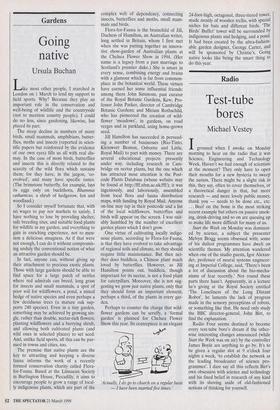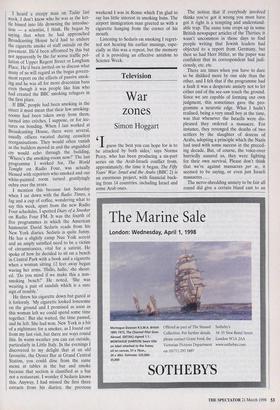Radio
Test-tube bores
Michael Vestey
Igroaned when I awoke on Monday morning to hear on the radio that it was Science, Engineering and Technology Week. Haven't we had enough of scientists at the moment? They only have to open their mouths for a new hysteria to sweep the nation. There might be a slight risk in this, they say, often to cover themselves, or a theoretical danger in that, but more research ŌĆö and more lovely public money, thank you ŌĆö needs to be done etc., etc. ... Beef on the bone is the most striking recent example but others on passive smok- ing, drink-driving and so on are queuing up to make life more difficult for many of us.
Start the Week on Monday was dominat- ed by science, a subject the presenter Melvyn Bragg seems obsessed with; some of his dullest programmes have dwelt on scientific themes. My attention wandered when one of the studio guests, Igor Alexan- der, professor of neural systems engineer- ing at Imperial College, said, 'There's been a lot of discussion about the bio-mecha- nisms of fear recently.' Not round these parts there hasn't. Apparently, in a lecture he's giving at the Royal Society entitled `The Loneliness of the Long Distant Robot', he laments the lack of progress made in the sensory perceptions of robots, or something like that. He need only study the BBC director-general, John Birt, to find the explanation.
Radio Four seems destined to become every test-tube bore's dream if the other- wise interesting changes announced (while Start the Week was on air) by the controller James Boyle are anything to go by. It's to be given a regular slot at 9 o'clock four nights a week, 'to establish the network as the leading broadcaster of science pro- grammes'. I dare say all this reflects Birt's own obsession with science and technology and his fixed belief in research of any kind with its shoving aside of old-fashioned notions of thinking for yourself. I heard a creepy man on Today last week. I don't know who he was as the ket- tle hissed into life drowning the introduc- tion ŌĆö a scientist, I think. He began by saying that when he had approached Broadcasting House he'd had to endure the cigarette smoke of staff outside on the pavement. He'd been affronted by this but not apparently by the far worse traffic pol- lution of Upper Regent Street or Langham Place. He'd been invited on to discuss what many of us will regard as the bogus govern- ment report on the effects of passive smok- ing and he was all for more draconian bans even though it was people like him who had created the BBC smoking refugees in the first place. If BBC people had been smoking in the street it must mean that their few smoking- rooms had been taken away from them, turned into creches, I suppose, or for lec- tures on bonding. When I last worked at Broadcasting House, there were several, usually offices vacated during ceaseless reorganisations. They would often vanish as the builders moved in and the anguished cry would echo through the building, `Where's the smoking-room now?' The last programme I worked for, The World Tonight on Radio Four, was actually blessed with reporters who smoked and our white-painted room turned gratifyingly ochre over the years. I mention this because last Saturday when I sat down with the Radio Times, a fag and a cup of coffee, wondering what to say this week, apart from the new Radio Four schedules, I spotted Diary of a Smoker on Radio Four FM. It was the fourth of five programmes in which the American humourist David Sedaris reads from his New York diaries. Sedaris is quite funny. He has a slightly camp Nuu Yoik accent and an amply satisfied need to be a victim of circumstances, vital for a satirist. He spoke of how he decided to sit on a bench in Central Park with a book and a cigarette when a woman sitting 12 feet away began waving her arms. 'Hallo, hallo,' she shout- ed. 'Do you mind if we make this a non- smoking bench?' He noted, 'She was wearing a pair of sandals which is a sure sign of trouble.'
He threw his cigarette down but gazed at it forlornly. 'My cigarette looked lonesome on the ground and I promised as soon as this woman left we could spend some time together.' But she waited, the time passed, and he left. She had won. New York is a bit of a nightmare for a smoker, as I found out from my last visit, but there are ways round this. In warm weather you can eat outside, particularly in Little Italy. In the evenings I discovered to my delight that at an old favourite, the Oyster Bar at Grand Central Station, you could dine from the same menu at tables in the bar and smoke because that section is classified as a bar not a restaurant. I wonder if Sedaris knows this. Anyway, I had missed the first three extracts from his diaries; the previous weekend I was in Rome which I'm glad to say has little interest in smoking bails. The airport immigration man greeted us with a cigarette hanging from the corner of his mouth.
Listening to Sedans on smoking I regret- ted not hearing his earlier musings, espe- cially as this was a repeat, but the memory of it is providing an effective antidote to Science Week.





































































 Previous page
Previous page